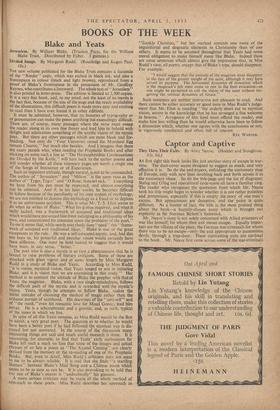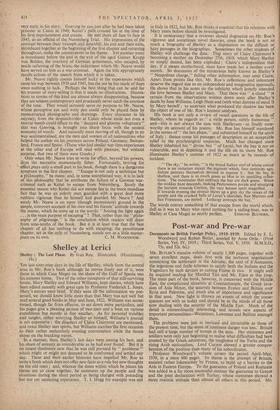Captor and Captive
AT first sight this book looks like just another story of escape in war- time. The dust-cover seems designed to suggest as much, and very effective it is. So do the end-papers, enfolding the customary map of Europe, only with new lines doubling back and forth across it in the customary chase. So do the title-page and the list of diagrams: Stalag and Ofiag and operational code-name all have a familiar ring. The reader who recognises the quotation from which Mr. Neave took his title might begin to wonder whether it is not rather pointless and pretentious, especially if this is simply the story of one man's escape. But appearances are deceptive, and the point is quite different. As a matter of fact, the title is the most pointed thing about the book—a happily-chosen irony which is brought out explicitly in Sir Norman Birkett's foreword.
Mr. Neave's story is not solely concerned with Allied prisoners of war like himself, for whom their exit meant escape. Equally impor- tant are the villains of the piece, the German war-criminals for whom there was to be no escape—only the exit appropriate to pantomime devils, through a trap-door. These contrasting exits are cardinal to the book. Mr. Neave first came across some of the war-criminals
very early in his story. Goering he saw. just after he had been taken prisoner at Calais in 1940; Keitel's path crossed his at the time of his first imprisonment and escape. He met them all face to face in 1945, as an official of the Nuremberg Trial. His impressions of.the contrast between their triumph and downfall, his exit and their exits, introduced together at the beginning of the first chapter and recurring throughout, make the counterpoint to his theme. Yet another irony is introduced before the end in the exit of the aged Gustav Krupp von Bohlen, the overlord of German armaments, who escaped, by senile softening of the brain,-the indictment which Mr. Neave would have served on him as a war-criminal. Again the title appropriately recalls echoes of the speech from which it is taken.
Mr. Neave rightly counts himself lucky in the experiences which came his way between 1939 and 1945,•but the use he has made of them owes nothing to luck. Perhaps the best thing that can be said for his manner of story-telling is that it needs no illustrations. Illustra- tions to stories of this kind are almost always disappointing, because they are seldom contemporary and practically never catch the emotion of the time. They would certainly serve no purpose to Mr. Neave, whose perceptive eye and witty pen could only be played false by reconstructed photographs and drawings. Every character in his odyssey, from the despatch-rider at Calais whose smile not even a mortar-bomb could efface to the "decayed and gloomy voluptuary" that was Goering, is brought into sharp focus with the neatest economy Of words. And naturally most moving of all, though in no way sentimentalised, are the men and women of all nationalities who helped the author on his journeys across Poland, Germany,. Switzer- land, France and Spain. (Those who had similar war-time experiences at the other end of Europe will read with pleasurC, but without surprise, that two of them were Greeks.) Only when Mr. Neave tries to write for effect, beyond-his powers, dces the narrative momentarily falter. Fortunately, striving for effect plays only a small part in his, book, though there is a dangerous symptom in the first chapter. "Escape is not only a technique but a philosophy," he states; and, in some -Unexplained way, it is to lack of this philosophy that he attributes the failure of a German war- criminal such as Keitel to escape from Nuremberg. Surely the essential reason why Keitel did not escape lies in the more mundane faCt that he was an elderly man guarded with a great deal more ruthless vigilance than he himself had guarded Mr. Neave ? And surely Mr. Neave is on surer (though inconsistent) ground in the simple, extrovert account of his own and his friends' attitude towards the matter, which he sums up in the words: "Joining the fight again ... is the main purpose of escaping" ? That, rather than the "philo- . sophy of pilgrimage," is the conclusion which readers will draw from nine-tenths of the book. But it is at least true that the best chapter of all has nothing to do with escaping; the penultimate chapter, set in the cells of Nuremberg, stands out as a little master-



































 Previous page
Previous page